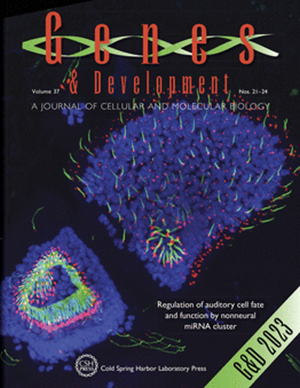细胞身份危机?衰老和年轻化过程中的可塑性变化
IF 7.5
1区 生物学
Q1 CELL BIOLOGY
引用次数: 0
摘要
成年多细胞生物体的细胞可塑性是一种保护机制,可使某些组织在受伤时再生。考虑到衰老涉及一生中反复受到的伤害,可以想象细胞特性本身随着年龄的增长更具可塑性--而且可能是错误的。在这篇综述中,我们总结并批判性地讨论了细胞身份发生与年龄相关转变的现有证据,重点是那些导致年龄相关病症(包括神经变性和癌症)的证据。具体来说,我们将重点放在已报道的与去分化、偏向分化、从替代系获得特征以及进入肿瘤前状态相关的程序实例上。据报道,一些最有前景的细胞年轻化方法也会引起细胞身份的短暂改变,因此我们进一步讨论了细胞状态改变和年轻化是否可以脱钩,从而产生更多可行的治疗策略。本文章由计算机程序翻译,如有差异,请以英文原文为准。
A cellular identity crisis? Plasticity changes during aging and rejuvenation
Cellular plasticity in adult multicellular organisms is a protective mechanism that allows certain tissues to regenerate in response to injury. Considering that aging involves exposure to repeated injuries over a lifetime, it is conceivable that cell identity itself is more malleable—and potentially erroneous—with age. In this review, we summarize and critically discuss the available evidence that cells undergo age-related shifts in identity, with an emphasis on those that contribute to age-associated pathologies, including neurodegeneration and cancer. Specifically, we focus on reported instances of programs associated with dedifferentiation, biased differentiation, acquisition of features from alternative lineages, and entry into a preneoplastic state. As some of the most promising approaches to rejuvenate cells reportedly also elicit transient changes to cell identity, we further discuss whether cell state change and rejuvenation can be uncoupled to yield more tractable therapeutic strategies.
求助全文
通过发布文献求助,成功后即可免费获取论文全文。
去求助
来源期刊

Genes & development
生物-发育生物学
CiteScore
17.50
自引率
1.90%
发文量
71
审稿时长
3-6 weeks
期刊介绍:
Genes & Development is a research journal published in association with The Genetics Society. It publishes high-quality research papers in the areas of molecular biology, molecular genetics, and related fields. The journal features various research formats including Research papers, short Research Communications, and Resource/Methodology papers.
Genes & Development has gained recognition and is considered as one of the Top Five Research Journals in the field of Molecular Biology and Genetics. It has an impressive Impact Factor of 12.89. The journal is ranked #2 among Developmental Biology research journals, #5 in Genetics and Heredity, and is among the Top 20 in Cell Biology (according to ISI Journal Citation Reports®, 2021).
 求助内容:
求助内容: 应助结果提醒方式:
应助结果提醒方式:


